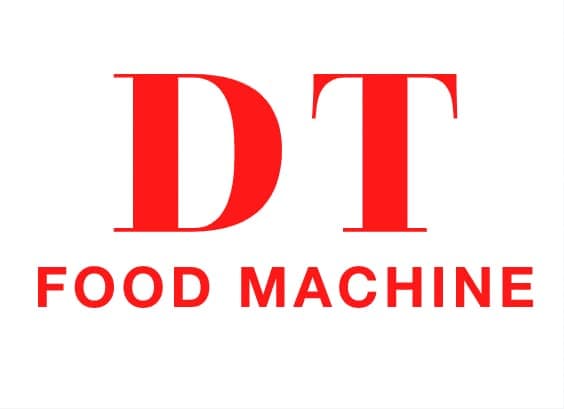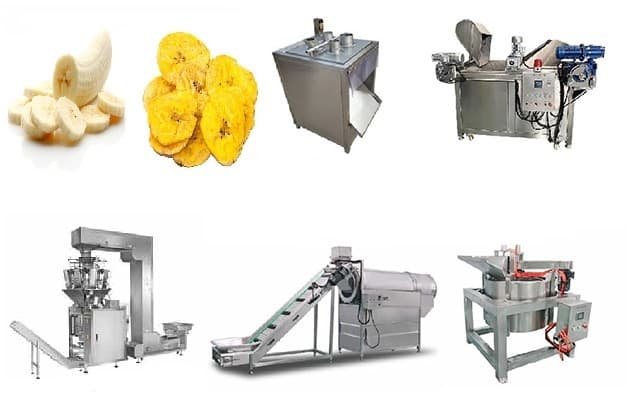Banana chips are among the most popular healthy snack options worldwide. Croustillant, tasty, and with long shelf life, they’re consumed across Asia, Afrique, et l'Amérique latine, and their demand is growing in Europe and North America. Si tu’re an entrepreneur or investor planning to enter the food manufacturing industry, a banana chips factory is a profitable and scalable venture. Dans ce guide, we will walk you through everything you need to know to start a banana chips production business—from selecting machinery to estimating setup costs.
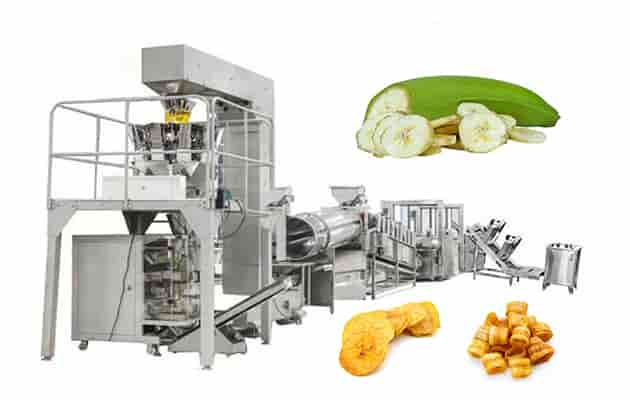
1. Market Potential for Banana Chips
Le global banana chips market is projected to grow at a CAGR of over 6% in the coming years. The growing demand for healthy, plant-based snacks, along with increasing urbanization and working-class populations, contributes significantly to this trend. De plus, banana chips have huge export potential due to their longer shelf life and demand in the vegan and gluten-free snack markets.
Key Market Trends:
- Rise in healthy snacking trends
- Increasing demand for packaged food
- Growth of e-commerce and direct-to-consumer brands
2. Types of Banana Chips
Before starting your factory, decide which type of banana chips you plan to produce:
2.1 Fried Banana Chips
- Deep-fried in vegetable oil
- Popular in Southeast Asia, Afrique, and India
- Variants: salted, épicé, doux
2.2 Baked Banana Chips
- Healthier, lower oil content
- Preferred in Western countries
2.3 Freeze-Dried Banana Chips
- Premium category
- Léger, longue durée de conservation
Your choice will affect the machinery, production line design, and target markets.
3. Step-by-Step Banana Chips Production Process
- Raw Banana Selection
- Saba, Nendran, or Plantain bananas are preferred.
- Peeling
- Manual or mechanical banana peeling machines.
- Tranchage
- Uniform slicing ensures even frying and consistent texture.
- Lavage
- Removes starch and impurities.
- Blanchiment (Facultatif)
- Enhances crispness and color.
- Frying/Baking
- Deep fryers or hot air ovens, depending on chip type.
- Dé-pétrole (for fried chips)
- De-oiling machines help reduce oil content.
- Assaisonnement
- Flavors such as cheese, spicy chili, ou chérie.
- Refroidissement
- Conveyor-type cooling systems.
- Conditionnement
- Automatic pouch packing machines with nitrogen flushing to maintain freshness.
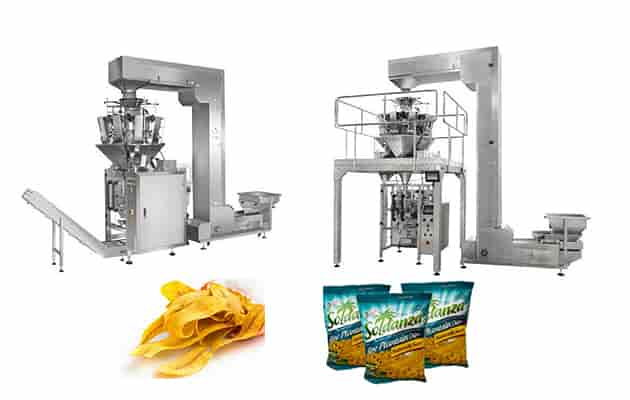
4. Ligne de production de chips de banane & Required Machinery
Below is a list of the essential machines you will need to build a fully automatic banana chips processing plant:
4.1 Machine à éplucher
- Capacité: 300–1000 kg / h
- Corps en acier inoxydable
4.2 Banana Slicer Machine
- Épaisseur réglable
- Rotary blade or centrifugal type
4.3 Machine à laver
- Bubble washer or rotary drum type
4.4 Friteuse
- Frite: Suitable for small-scale setups
- Friteuse continue: Best for industrial scale
- Oil filtration and temperature control systems included
4.5 Machine à pétannière
- Centrifugal system to reduce excess oil
4.6 Machine à assaisonner
- Drum-type mixer for even coating
4.7 Machine d'emballage
- Pesée multi-têtes + vertical form fill seal (VFFS) machine
- Nitrogen flushing system for freshness
Équipement optionnel:
- Blanchir
- Détecteur de métaux
- Date printer
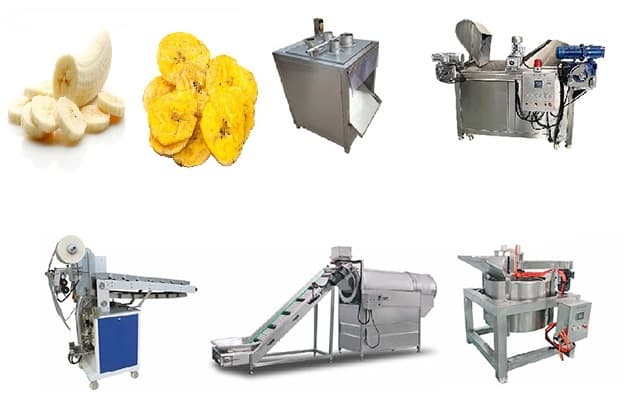
5. Layout Design for Banana Chips Factory
Small-Scale Plant Layout (500 kg / jour)
- Space Requirement: 100–200 sqm
- Ligne semi-automatique
Medium-Scale Plant Layout (1000–3000 kg/day)
- Space Requirement: 500–800 sqm
- Fully automatic with continuous fryer
Large-Scale Industrial Layout (5000+ kg / jour)
- Space Requirement: 1000+ sqm
- Turnkey project with full automation, oil recycling system, waste management, etc..
6. Investissement & Ventilation des coûts
| Article | Coût estimé (USD) |
|---|---|
| Banana Chips Machines (complete line) | $30,000 - $120,000 |
| Factory Setup (bâtiment, services publics) | $20,000 - $80,000 |
| Labor and Staff (d'abord 6 mois) | $10,000 - $25,000 |
| Matières premières & Conditionnement | $5,000 - $15,000 |
| Certifications & Licence | $2,000 - $5,000 |
| Commercialisation & Image de marque | $3,000 - $10,000 |
| Investissement total estimé | $70,000 - $250,000 |
Costs vary based on production capacity, location, et le niveau d'automatisation.
7. Licence & Regulatory Requirements
General Licenses Required:
- Business Registration
- Food Safety License (par exemple., FDA, FSSAI)
- Export License (si vous vendez à l'international)
- Environmental Clearance
Make sure to comply with local and international food safety standards such as HACCP, ISO 22000, etc..
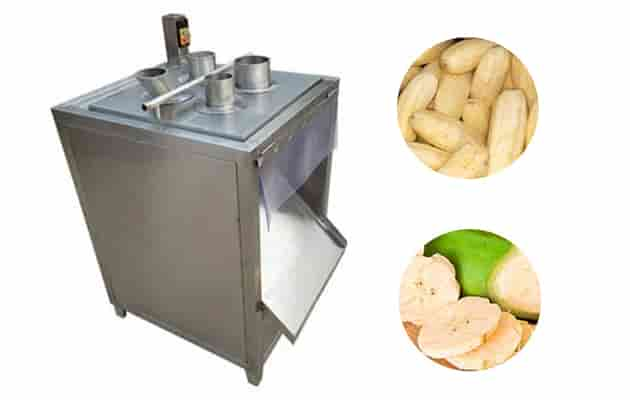
8. Commercialisation & Distribution Strategy
To scale your banana chips business, plan both B2B and B2C channels:
B2B (Bulk Sales)
- Supermarchés & chaînes de détail
- Distributors & wholesalers
- Export to foreign countries
B2C (Retail Packaged Sales)
- Plateformes de commerce électronique (Amazone, Shopee)
- Your brand website
- Annonces sur les réseaux sociaux
Conseils:
- Use attractive packaging with transparent fronts
- Highlight « healthy snack », « sans gluten », ou « vegan » étiquettes
9. Marge bénéficiaire & Retour de retour
Banana chips offer high profit margins of 30% à 50% depending on efficiency, waste control, and branding. Most small to medium factories achieve ROI within 12–24 mois.
10. Tips for Success
- Invest in high-quality stainless steel machines
- Optimize oil usage and recovery
- Innovate with new flavors and packaging
- Get customer feedback early to refine product
- Focus on branding to stand out in a crowded snack market
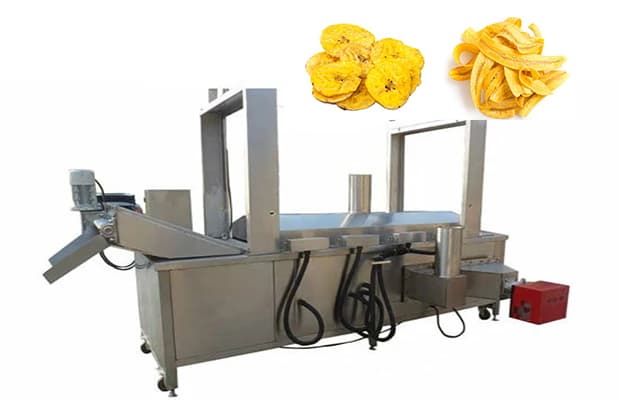
Conclusion
Starting a banana chips factory is a promising business opportunity with strong demand and export potential. By choosing the right machinery, setting up a smart layout, and implementing effective marketing, you can build a profitable snack manufacturing enterprise. Que vous’re starting small or planning a large industrial setup, the key to success lies in product consistency, quality control, and branding.
Need Help with Banana Chips Machinery?
We are a leading manufacturer of banana chips machines and turnkey production lines. Contact us today to get a customized quote and plant layout tailored to your needs!
